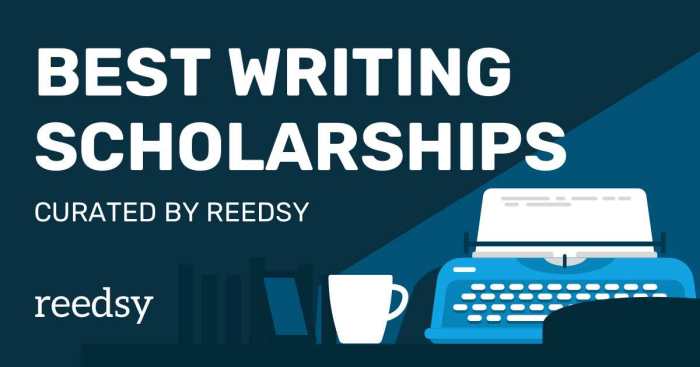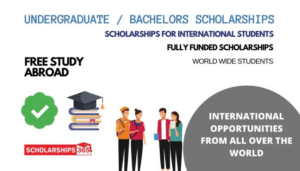Overview of Scholarships for Creative Writing Students: Best 5 Scholarships For Creative Writing Students 2025
Best 5 scholarships for creative writing students 2025 – Scholarships play a pivotal role in supporting creative writing students by alleviating financial burdens and allowing them to focus on honing their craft. The significance of these scholarships extends beyond mere financial assistance; they also foster a rich literary community, encouraging diverse voices and innovative storytelling. For aspiring writers, pursuing scholarships specifically designed for creative writing can open doors to mentorship opportunities, workshops, and networking events that can significantly enhance their educational experience.Creative writing scholarships come in various forms, each catering to different needs and backgrounds.
Pursuing these scholarships not only helps students financially but also elevates their profiles in the competitive literary field. Below is a detailed overview of the types of scholarships available for creative writing students:
| Type of Scholarship | Description |
|---|---|
| Merit-Based | Given to students based on their writing skills and academic achievements. |
| Need-Based | Aimed at students demonstrating financial need, helping to make education accessible. |
| Genre-Specific | Targeted towards students focusing on specific genres like poetry, fiction, or screenwriting. |
| Institution-Specific | Offered by universities or colleges, often requiring enrollment in their programs. |
| Creative Competitions | Based on student submissions for specific writing contests, judged by professionals. |
Top 5 Scholarships for Creative Writing Students in 2025
Several scholarships stand out in 2025 for their commitment to supporting creative writing students. Each of these scholarships offers unique benefits and opportunities for aspiring writers, enabling them to pursue their passion with reduced financial stress.
- The Fulbright Program: This prestigious scholarship allows writers to study and conduct research abroad. Eligibility includes U.S. citizenship and a completed undergraduate degree.
- The University of Iowa Writers’ Workshop Scholarships: Renowned for its creative writing program, Iowa offers several merit-based scholarships for students accepted into its workshop. Candidates must submit a portfolio of writing samples.
- The National Endowment for the Arts Fellowships: These fellowships provide grants for creative writers working on specific projects. Applicants must demonstrate excellence in their writing and provide a detailed project proposal.
- The Jack Kerouac Project: This unique scholarship offers a residency for writers. Eligibility requires a published work and a commitment to creating new content during the residency.
- The PEN America Emerging Voices Fellowship: Aimed at writers from underserved communities, this fellowship provides mentorship and workshops. Candidates must submit a writing sample and personal statement detailing their background and aspirations.
Application Process for Scholarships
Applying for scholarships as a creative writing student involves several important steps. The process typically requires careful preparation and attention to detail to align with the specific requirements of each scholarship.The general steps involved in the application process include:
- Researching scholarships that match your interests and qualifications.
- Gathering necessary documents, including transcripts, recommendation letters, and writing samples.
- Drafting a compelling personal statement or essay that highlights your writing journey and ambitions.
- Submitting the completed application before the specified deadlines.
Below is a table summarizing the typical documents required for the application process:
| Document | Description |
|---|---|
| Transcripts | Official academic records reflecting your performance. |
| Recommendation Letters | Letters from teachers, mentors, or professionals familiar with your writing skills. |
| Writing Samples | A portfolio showcasing your best writing work relevant to the scholarship. |
| Personal Statement | An essay discussing your passion for writing and future goals. |
Tips for Writing a Winning Scholarship Essay, Best 5 scholarships for creative writing students 2025

Crafting a compelling scholarship essay is crucial for standing out in a competitive applicant pool. Here are some effective strategies to enhance your writing and appeal to scholarship committees.When writing your essay, consider these strategies:
- Start with a strong opening that captures attention and sets the tone for your story.
- Clearly Artikel your passion for creative writing and how it has shaped your life.
- Utilize vivid imagery and personal anecdotes to create an emotional connection with the reader.
- Conclude with a powerful closing that reinforces your commitment to pursuing your writing career.
Common themes that resonate well with scholarship committees often include personal growth, overcoming challenges, and the impact of writing on your life. Below is a list of dos and don’ts for writing effective scholarship essays:
- Dos:
- Do be authentic and true to your voice.
- Do proofread for grammar and clarity.
- Do stay within the word count limits.
- Don’ts:
- Don’t use clichés or overused phrases.
- Don’t submit your essay without revisions.
- Don’t stray off-topic or include irrelevant information.
Resources for Finding Additional Scholarships
In addition to the prominent scholarships mentioned, there are numerous online platforms and organizations dedicated to listing scholarships for creative writing students. These resources can greatly simplify the search process for aspiring writers.Some effective strategies for discovering lesser-known scholarship opportunities include:
- Leveraging social media platforms to connect with fellow writers and educators who may share leads on scholarships.
- Joining writing groups and literary organizations that often provide information about grants and scholarships.
- Attending writing workshops and literary events where scholarship opportunities are frequently discussed.
Below is a table comparing several scholarship search engines and their features:



